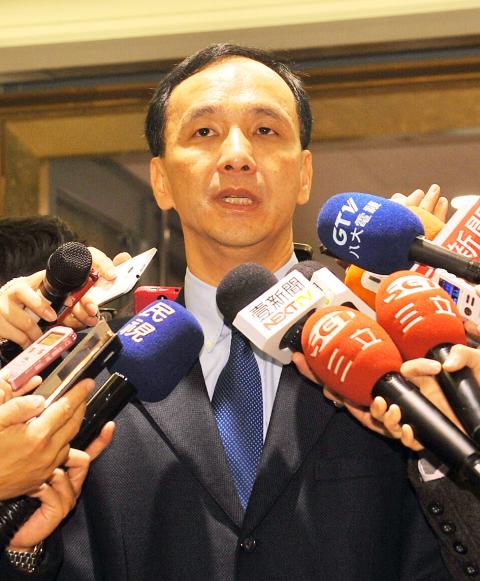Chinese Nationalist Party (KMT) Chairman Eric Chu (朱立倫) yesterday cautioned against holding next year’s presidential and legislative elections on the same day, saying that it would lead to a four-month period between electing a new president and the end of President Ma Ying-jeou’s (馬英九) term on May 20.
The eighth legislature is scheduled to end on Jan. 31 next year, so the election for the ninth legislature has to take place before Jan. 21.
Ma’s term expires on May 20 next year, so the presidential election must be held by April 19.

Photo: Lai Hsiao-tung, Taipei Times
While there are calls to synchronize the two polls, others including former Central Election Commission chairman Huang Shih-cheng (黃石城) have objected to the proposal, saying that the government and the legislature might be forced into a four-month period of inactivity should an opposition candidate win the presidential election in January as he or she would not be able to take office until May.
In response to media queries, Chu yesterday said that there were many viewpoints which had valid aspects, adding that although combining the elections would save money from the public coffers, it also meant that the president-elect would have a four months overlap with the incumbent president.
The issue was extant in the last combined elections in 2012, but worries were greatly mitigated by the fact that Ma was then running for his second term and the probability of a newly elected president having an overlap with the incumbent was split 50-50, Chu said, adding that in next year’s election the problem is bound to occur.
In related news, Democratic Progressive Party (DPP) chairperson Tsai Ing-wen (蔡英文) yesterday said that the issue of the “four-month window” was debated ahead of the 2012 presidential election and that the KMT had then proposed to have the presidential election combined with the legislative election.
The KMT needs to come to a consensus on what its stance is on the issue, and should offer an explanation on why it is reversing its previous support, Tsai said.
The public would believe that political considerations were behind such a reversal of attitudes, Tsai said, adding that the DPP felt that the problem should be based on the stability of the system and resolved via legal regulations.
If such processes are sanctioned by law and become stable long-term systems, political parties could not be accused of seeking to amend processes in their own interests when it suits them, Tsai said.
The DPP has already proposed the draft statute on the handover of the president and the vice president in hope of securing specific regulations and ensuring the stability of the transitioning government, she added.
Asked whether the CEC might rethink its position on the matter after Chu’s comments, Tsai said the commission is a neutral body on electoral matters and should consider which system is best for the nation to guarantee maximum stability.

The Ministry of Economic Affairs has fined Taobao NT$1.2 million (US$36,912) for advertisements that exceed its approved business scope, requiring the Chinese e-commerce platform to make corrections in the first half of this year or its license may be revoked. Lawmakers have called for stricter enforcement of Chinese e-commerce platforms and measures to prevent China from laundering its goods through Taiwan in response to US President Donald Trump’s heavy tariffs on China. The Legislative Yuan’s Finance Committee met today to discuss policies to prevent China from dumping goods in Taiwan, inviting government agencies to report. Democratic Progressive Party Legislator Kuo Kuo-wen (郭國文) said

The Ministry of Economic Affairs has fined Taobao NT$1.2 million (US$36,900) for advertisements that exceeded its approved business scope and ordered the Chinese e-commerce platform to make corrections in the first half of this year or its license would be revoked. Lawmakers have called for stricter supervision of Chinese e-commerce platforms and more stringent measures to prevent China from laundering its goods through Taiwan as US President Donald Trump’s administration cracks down on origin laundering. The legislature’s Finance Committee yesterday met to discuss policies to prevent China from dumping goods in Taiwan, inviting government agencies to report on the matter. Democratic Progressive Party

Taiwan and its Pacific ally Tuvalu on Tuesday signed two accords aimed at facilitating bilateral cooperation on labor affairs, according to Taiwan’s Ministry of Foreign Affairs (MOFA). The governments inked two agreements in Taipei, witnessed by Foreign Minister Lin Chia-lung (林佳龍) and visiting Deputy Tuvaluan Prime Minister Panapasi Nelesone, MOFA said in a news release. According to MOFA, the agreements will facilitate cooperation on labor issues and allow the two sides to mutually recognize seafarers’ certificates and related training. Taiwan would also continue to collaborate with Tuvalu across various fields to promote economic prosperity as well as the well-being of their

Sung Chien-liang (宋建樑), who led efforts to recall Democratic Progressive Party (DPP) Legislator Lee Kun-cheng (李坤城), was released on bail of NT$80,000 today amid outcry over his decision to wear a Nazi armband to questioning the night before. Sung arrived at the New Taipei District Prosecutors’ Office for questioning in a recall petition forgery case last night wearing a red armband bearing a swastika, carrying a copy of Adolf Hitler’s Mein Kampf and giving a Nazi salute. Sung left the building at 1:15am without the armband and covering the book with his coat. Lee said today that this is a serious